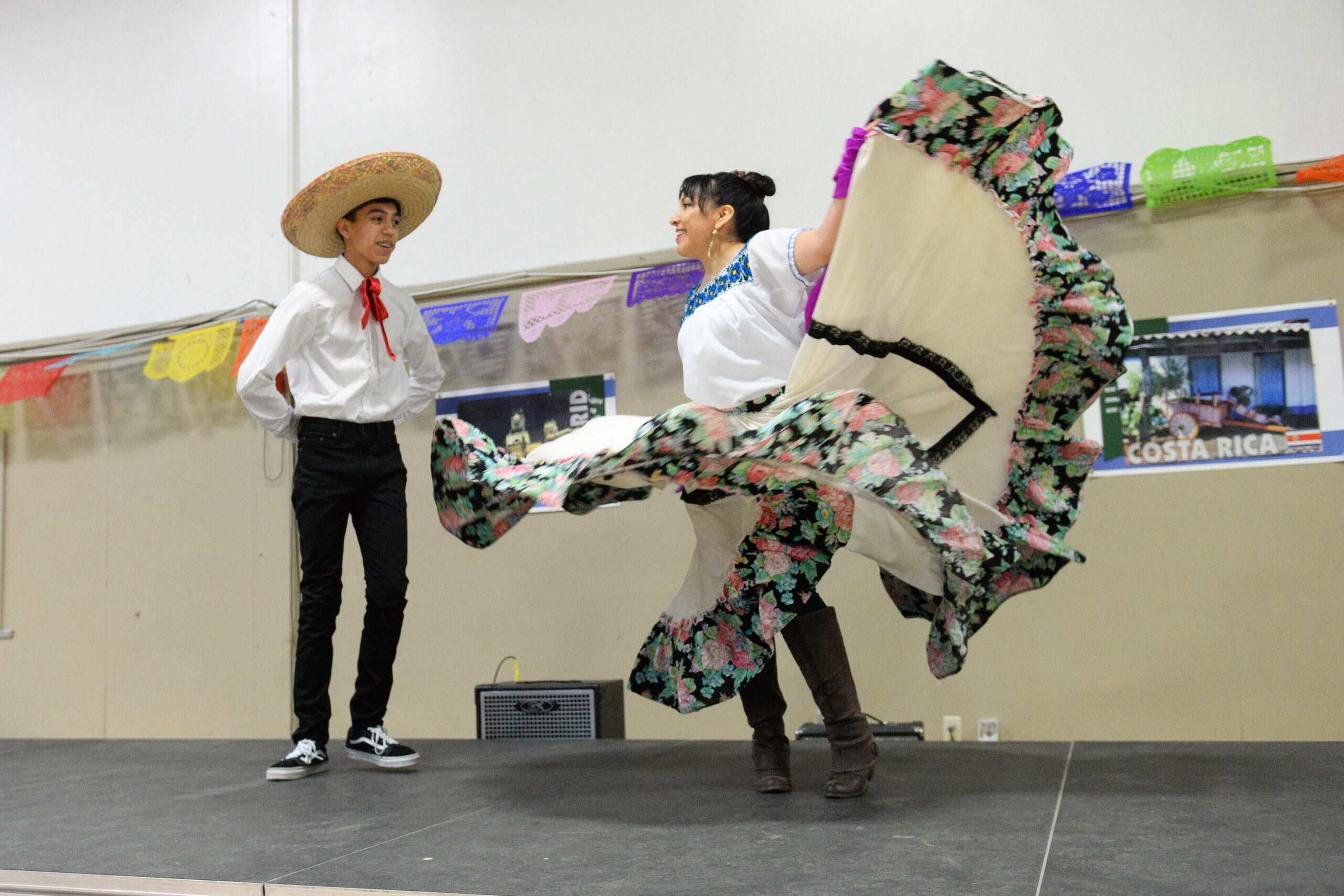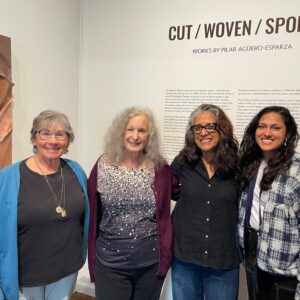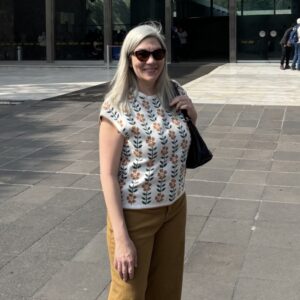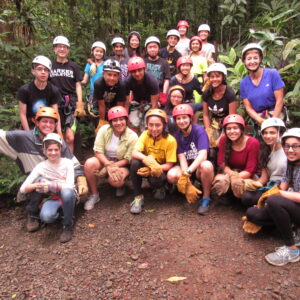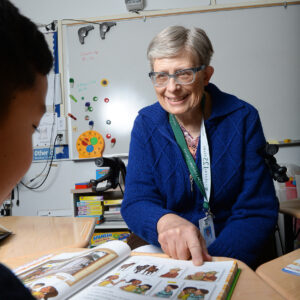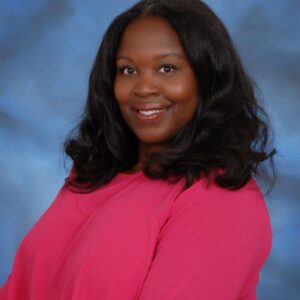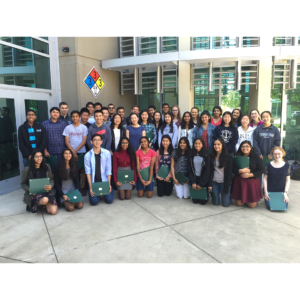This article originally appeared in the winter 2019 issue of Harker Magazine.
Junior Tessa Muhle is passionate about languages. A student of both Spanish and Latin, she has taken full advantage of Harker’s comprehensive language programs since enrolling in the school as a sophomore. She said she “foolishly” thought Spanish would be easy to learn when she was younger, but has now developed a love for travel and culture that demands more nuanced comprehension.
“Learning Spanish allows me to broaden my view of the world and thoroughly immerse myself in a different culture,” said Muhle, who is currently taking Level 3 Honors Spanish. Last April, she was part of the Harker Spanish program’s delegation to Andalusia in southern Spain and, in August, she volunteered with the nonprofit organization Amigos de las Americas in Panama, where she helped with turtle conservation efforts and immersed herself in the local culture.
“Both trips stretched my speaking ability and made me infinitely more confident,” she said. Muhle also is enrolled in Level 3 Honors Latin, which perfectly complements her Spanish study because of Latin’s influence on other languages, she said. “I can use Latin words to figure out what Spanish words mean. For example, the Spanish verb ‘morir,’ which means ‘to die,’ derives from the Latin verb ‘mori,’ which means the same thing.”
By requiring its students to study language – fully embedded in a deeper examination of culture – Harker is helping them develop a facility for language not often se n at the middle and high school levels. Students also grow to understand the interconnectedness of the world in which they live, which is increasingly multilingual and multicultural. They learn to shed prejudices and stereotypes and gain new perspectives through lenses and cultural norms different from their own.
“Language learning is a window into cultures, people and practices,” said Abel Olivas, upper school Spanish teacher and modern and classical languages department chair. “It’s also an excellent mental exercise because it stretches students’ brains by teaching them to integrate new structures in communication while developing their ear for unfamiliar sounds.”
Intensive Programs
Harker provides every student with a strong foundation in one of five foreign languages –French, Japanese, Latin, Mandarin and Spanish – by requiring the completion of Level 3, which most students attain during grade 9. Spanish alone is offered for Harker’s youngest students beginning in grade 1, when they start to explore the panish language and culture to help them understand their own culture and language by comparison. In grades 4 and 5, Spanish students learn the language’s basic structures and continue to develop their vocabulary skills in preparation for daily practice in middle school.
When all students begin taking formal classes in grade 6 in the language of their choice, they work on developing the basic skills necessary to study a foreign language successfully, including listening, reading, speaking and writing. “Our focus in middle school is on communication,” said Carol Parris, modern and classical languages department chair for grades 1 through 8 who has taught French at Harker since 1976. “We give them the tools they need to understand how language is constructed. When they learn something in French, for example, they can compare it to what they know about English, and why one language might make more sense than the other. What students learn in a foreign language helps them in their English classes, both in grammar and composition.”
Tanay Sharma, a ninth grader currently taking Level 3 Honors French, said that is indeed the case. “We take timed writing tests in French and this has helped me become a better writer in English. I’ve learned to use the time given to formulate a proper essay successfully.”
In an era when most schools have eliminated the study of Latin, Harker’s Latin students flourish in their knowledge of the underpinnings of all language, said Lisa Masoni, middle school Latin teacher. In Latin courses, the emphasis is on developing strong reading and writing skills.
“We see a lot of value in Latin, in that it provides the roots of the English language and other modern languages, and it still influences many of our cultural ideas,” Masoni said. “In general, language study teaches students to read carefully, analyze critically and understand different viewpoints.” Students of Latin study the social and political history of ancient cultures and improve their comprehension skills through the reading and analyzing of classical prose and poetry.
Trisha Variyar, a ninth grader in her third year of Latin, finds her knowledge of Latin has enhanced skills she can draw on in other coursework and activities. “I have seen an overall improvement in my vocabulary because I can analyze the roots of words and connect them to the English meaning,” she said.
Many upper school students continue to progress with their chosen language by taking honors and AP courses as they develop an understanding of the more complex structures of language. Harker is one of only a few schools in the Bay Are that offers five languages through the AP level and it’s not uncommon for students to earn the top score of 5 on AP language exams and scores in the 800s on the SAT’s language subject tests, given the strong foundation in languages they’ve acquired in seven years of instruction at Harker. Options for post-AP study include courses focused on such topics as literature, contemporary global issues and the arts. Many students go on to study foreign languages in college, take advantage of study abroad programs to further develop their skills and find employment that requires bilingualism.
Engaging Classrooms
Harker’s excellent language teachers bring to bear their own diverse life experiences in engaging students in creative learning that expands their knowledge. Each department, with the exception of Latin, includes teachers who are native speakers and often ones who have lived outside the United States. Language learning at Harker is student centered and immersive, as students and teachers speak the target language as much as possible, even in interactions outside of class.
“Hearing my teacher’s greeting of ‘Bonjour, Félicie’ transports me to a different world,” said AP French student Farah Hosseini, grade 11, referring to her chosen classroom name. “Speaking French in class is challenging, but also refreshing and rewarding, as it’s a change of pace from my other classes.”
Seventh grader Neil Krishnan, after only one year of French, has begun to recognize French terms and inferences all around him. “In English, I read Steinbeck’s ‘The Affair at 7, Rue de M,’” he said. “I had a deeper understanding of the book than those who didn’t have any French knowledge.” Krishnan’s classmate, Saanvi Bhargava, has had a similar experience in Concert Choir. “We are singing a French song and I am able to interpret the lyrics, which enhances my understanding of the song,” she said.
Mandarin teacher Xiuyu Gao has taught at Harker for seven years, having previously taught in her native China and the United Kingdom. She shares teaching duties with Shaun Jahshan, who holds a Ph.D. in Chinese literature from Stanford. “It’s interesting for our students to have both of our perspectives,” said Gao, who noted that she enjoys sharing her personal experiences of living in China for 35 years. “Harker students benefit from my deep understanding of the culture and its education system, which is much more rigid than the American system.” By comparison, she described Harker’s way o teaching as “loving, caring and encouraging.”
French teacher Agnès Pommier agreed that Harker’s nurturing environment is ideal for language students. “We require speaking French all the time, so students do make mistakes, but we teach our students to respect each other and encourage them to master their own learning process and to do their best each day,” she said.
Harker’s language teachers keep abreast of the latest teaching methodologies by pursuing professional development opportunities locally and in their target language countries, enabling them to engage students with differing learning styles, including kinesthetic, visual, auditory and tactile. Activities such as games, films, music, dramatic presentations, and paired and small group hands-on projects are all a regular part of language classrooms. Students’ strengths and interests are emphasized, fostering opportunities for students to shine by using their talents in music, fine arts, cooking, dance and drama to bring a language to life. Festival celebrations like El Día de los Muertos, Mardi Gras, Setsubun (the day before the beginning of spring in Japan), King’s Day, the Chinese Moon Festival and Chinese New Year (during which students create dragons for a parade) encourage learning about different cultures’ customs, cuisines and histories.
Technology like Kahoot and Quizlet – simple and effective online learning tools that assist students in mastering vocabulary – is often employed in the classroom, Olivas said. “We use these tools not just for the sake of using technology, but because they give our students practice in a way that’s engaging, energetic and fun. The idea is to expose students to different learning tools so they can determine what works best for them.”
Sixth grader Tom Campisi, in his first year of learning Mandarin, appreciates that his teachers understand that it can be jarring to learn a new language. “We have fun by using rhymes and poems in Chinese to help with tones and pronunciation,” he said. Senior Rani Sheth, who began taking Spanish in sixth grade, recalled building stories in class. “We’d sit in a circle and each person would write a sentence and pass it on to the next person to continue,” she said. “It resulted in really hilarious stories and great conversation.”
Both Yumiko Aridomi and Keiko Irino, who teach Japanese at the upper school, are natives of Japan and are skilled in Japanese pedagogy. Because Japanese is a difficult language to learn, they regularly enrich classroom learning by encouraging students’ interests in Japanese anime, food and games.
“The teachers really love what they do and it shows through their enthusiasm for teaching us,” said sophomore Kailash Ranganathan, who is currently taking Level 4 Honors Japanese. “They’re experts in the field and they understand how we learn best, encouraging friendly competition through activities that motivate everyone to do their best.”
Upper school French teacher Galina Tchourilova, who first studied French language and culture as a university student in her native Russia, noted that language study offers many opportunities to challenge students’ worldviews, deepen their cultural knowledge and learn how other societies approach complex issues. “For example, in my AP classes, we consider many topics from a French perspective, such as scientific discoveries, global health issues, music and sports. We have wonderful discussions. Students are able to make comparisons given their own life experiences.”
Hosseini agreed that classroom discussions are lively. She noted that breaking down themes such as identity or contemporary family life has helped her expand her vocabulary and drastically improve her pronunciation. “I’ve noticed that I’m able to form complex sentences more easily without having to think twice about it,” she said.
Through the study of Chinese, senior Sana Pandey has developed an appreciation for the interplay of perspectives across all subjects. “The intersection of history, culture and language in Mandarin has helped me view concepts in other classes through multifaceted lenses,” said Pandey, who has studied Mandarin since sixth grade and hopes to major in linguistics in college.
Outside the Classroom
Language learning doesn’t stop at the end of the school day at Harker. Many students participate in activities that extend their learning beyond the classroom, including dining at local restaurants, visiting San Francisco’s Chinatown or a local Japanese garden for a tea ceremony, and attending cultural fairs, festivals and museum exhibits around the Bay Area, like a Spanish class field trip to the San Jose Museum of Quilts & Textiles. Students also prepare for and participate in national language contests that test reading, writing and speaking comprehension.
Each language offered at Harker has a complementary student honor society, through which members organize and enjoy cultural activities, including target language cultural nights at Harker. Other examples include students in the Japanese National Honor Society volunteering at local Japanese-Amer can museums and a Buddhist temple. Those in the Spanish National Honor Society publish Pórtico, an online publication of articles on current events, culture, trips and people of interest.
“Many of our students also do community service in local clinics and schools,” said upper school Spanish teacher Diana Moss. “These are enriching experiences for them, all the more so when they can use their language skills in practical settings, which reinforces what they’re learning in the classroom.”
Harker’s global education program offers language students the opportunity to travel to countries in which they can immerse themselves in the culture while practicing their speaking and comprehension skills. Students have enjoyed intercultural exchanges and immersion trips to several of Harker’s sister schools, including Tamagawa Academy in Tokyo, Japan; Nuevo Milenio in Grecia, Costa Rica; the World Foreign Language Middle School in Shanghai, China; and the Collège de Gambach in Fribourg, Switzerland, to which French students have traveled in the past. Last winter, French students visited Quebec City in Canada during its Winter Carnival.
“When they travel, students realize how much more dynamic their interactions are when they can speak the language of the country they’re visiting,” Moss said.
Visiting historic sites and delving into Japanese culture firsthand during Harker’s trip to Tokyo and Sapporo last summer was “incredibly fun,” said sophomore Erica Cai, who is now enrolled in Level 4 Honors Japanese. “The trip helped me tremendously, as I experienced using Japanese in real-world situations,” she said. “You can only learn so much from a textbook, no matter how good your teachers are.” Masoni directs Harker’s Junior Classical League, or Latin Club, which helps students prepare for Latin competitions at the local, state and national levels. Students have a choice of academic tests in areas such as vocabulary, reading comprehension, mythology or Roman history, and then complete projects based on the ancient world, such as building a model of an aqueduct. They also can compete in an athletic Olympiad.
“The competition is a chance for our students to meet other students learning Latin,” Masoni said. “It’s a lot of fun and students can bond over everyone asking them why they’re taking a dead language!”
With a dynamic and intensive curriculum taught by dedicated teachers, wide ranging cultural experiences and travel to foreign countries that allow for full immersion, students in Harker’s language programs develop as knowledgeable global citizens who see the value in learning about the world from other perspectives.
Sheth and fellow senior Jeffrey Yang are currently taking the post-AP course on Spanish literature and film – focused on the novel “Como Agua Para Chocolate” (“Like Water for Chocolate”) – and have performed together on cello at Harker’s Spanish Culture Night. That experience was a “super fun way to explore the artistic side of the language,” Sheth said. Yang agreed, noting that in studying another language “we learn not only to speak and write the language, but also to embody its culture and ideology.”
Marla Holt is a freelance writer based in Minnesota.
